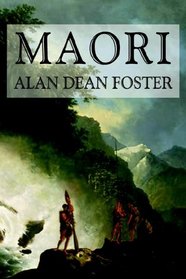Helpful Score: 1
An Epic Historical NOVEL, February 18, 2003
Reviewer: Pam Hanna "wind star" (Thoreau, New Mexico United States)
...
The story starts in 1839 and spans more than 50 years. It concerns an English sea captain of his times (who nevertheless learned the Maori language), and his sons by his English wife, his Irish mistress and the Maori love of his life.
What bothers me about *Maori* is that it's called an "epic historical fantasy." This is a misnomer since the fantastic elements in it are a matter of historical record. After his epilogue, the author states that,
"Although real and fictional personages mix freely in this tale, the sighting of the death canoe by two separate parties of travelers and the entombment and subsequent rescue and death of the 104-year-old Maori, Tohunga [a shaman] known as Tuhoto, are a matter of historical record."
As is the eruption in 1886 of the volcano Tarawera and the burying of the "eighth wonder of the world", the pink and white limestone terraces that drew sight-seers from all over the 19th century world.
Alan Dean Foster is known primarily as a science fiction writer, so his publishers probably assumed it had to be "historical fantasy." It's an historical novel. Period. I'm amazed that it has received no other Amazon reviews because it's quite simply the best historical novel I've ever read.
Reviewer: Pam Hanna "wind star" (Thoreau, New Mexico United States)
...
The story starts in 1839 and spans more than 50 years. It concerns an English sea captain of his times (who nevertheless learned the Maori language), and his sons by his English wife, his Irish mistress and the Maori love of his life.
What bothers me about *Maori* is that it's called an "epic historical fantasy." This is a misnomer since the fantastic elements in it are a matter of historical record. After his epilogue, the author states that,
"Although real and fictional personages mix freely in this tale, the sighting of the death canoe by two separate parties of travelers and the entombment and subsequent rescue and death of the 104-year-old Maori, Tohunga [a shaman] known as Tuhoto, are a matter of historical record."
As is the eruption in 1886 of the volcano Tarawera and the burying of the "eighth wonder of the world", the pink and white limestone terraces that drew sight-seers from all over the 19th century world.
Alan Dean Foster is known primarily as a science fiction writer, so his publishers probably assumed it had to be "historical fantasy." It's an historical novel. Period. I'm amazed that it has received no other Amazon reviews because it's quite simply the best historical novel I've ever read.
In the grand tradition of Shogun, bestselling author Alan Dean Foster has created a dazzling epic fantasy of a strange but enchanted land.
"His name was Robert Coffin, but the Maori natives called him Iron Hair. A civilized man in the raw wilderness of New Zealand, he had come to forge a nation at the end of the world--and discovered a magical world beyond his strangest dreams.
A world of astonishing beauty and breathtaking adventure, the natives called it the Land of the Long White Cloud. And Robert Coffin was about to enter it's greatest mystery, cast in the wonderous spell of a shaman whose magic would change his life forever..."
"His name was Robert Coffin, but the Maori natives called him Iron Hair. A civilized man in the raw wilderness of New Zealand, he had come to forge a nation at the end of the world--and discovered a magical world beyond his strangest dreams.
A world of astonishing beauty and breathtaking adventure, the natives called it the Land of the Long White Cloud. And Robert Coffin was about to enter it's greatest mystery, cast in the wonderous spell of a shaman whose magic would change his life forever..."
It's the first I've read about the Maori and the story which is a blend of fact and fiction flows so well. I was a bit worried as the reviewers I saw rated it 3 stars but for me that means I liked the book. It is certainly worth reading. Believed by many of the settlers in New Zealand to be ignorant heathen, the intelligence exhibited by both individuals and the tribes seems quite complex. The role of Maori beliefs in their gods is fascinating. The eruption of Mount Terawera was fortold by a 104-year-old Maori tunga named Tuhuto who was rescued after being buried by ash and mud. His rescue and death is recorded in the country's historical records as is the sighting of the death canoe prior to the eruption. This read makes one want to read much more about the Maori. What a fascinating tribe of people! And Foster weaves a story of the whites who settled the area around the Maori, using one family as a primary focus.
Historical fictions in the style of James Clavell are my favorite novels and finding a good read in that genre isn't easy. "Maori" is an enjoyable book, with a story line that clearly was influenced by Clavell's "Taipan". But don't expect the level of character development in this novel that Clavell achieved in his vastly superior book. Maori's characters are more one-dimensional; for example, while the protagonists in both books are characters with both huge flaws and strong positives, Foster's Robert Coffin ends up feeling mostly dislikeable while Clavell's Dirk Struan leaves the reader with a stronger sense of admiration for him despite his flaws. The difference in achieving well-rounded personalities is equally as great when comparing the two mistresses, Robert Coffin's Merita and Dirk Struan's May-May. As long as you don't expect the nuanced character development of Clavell, "Maori" is a satisfying read.




